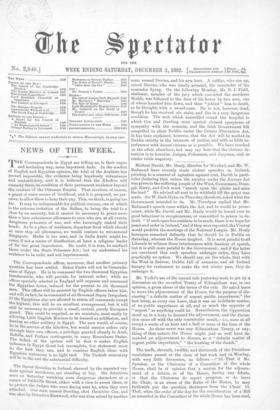The Correspondents affirm, moreover, that another primary question has been
settled. Baker Pasha will not be Generalis- simo of Egypt. He is to command the two thousand Egyptian Gendarmerie, who will provide for internal order; while an officer specially selected in England will organise and command the Egyptian Army, reduced for the present to six thousand men. This officer will be assisted by English officers below him, and will, in fact, be in command of six thousand Sepoy Irregulars. If the Egyptians also are allowed to attain all commands except the highest, this will be an excellent arrangement, but it will still be necessary to provide a small, central, purely European guard. This could be supplied, as we maintain, most easily by allowing 1,200 English Marines to be trained as artillerists, and leaving no other artillery in Egypt. The men would, of course, be in the service of the Khedive, but would receive orders only through their own officers, a privilege granted already to Arab, Rohilla, and Pathan contingents, in many Mussulman States. The defect of the system will be that it makes English influence in Egypt direct but incomplete, but statesmen must do the best they can, and to combine English ideas with Egyptian autonomy is no light task. The Turkish suzerainty will be in the end the substantial difficulty.






































